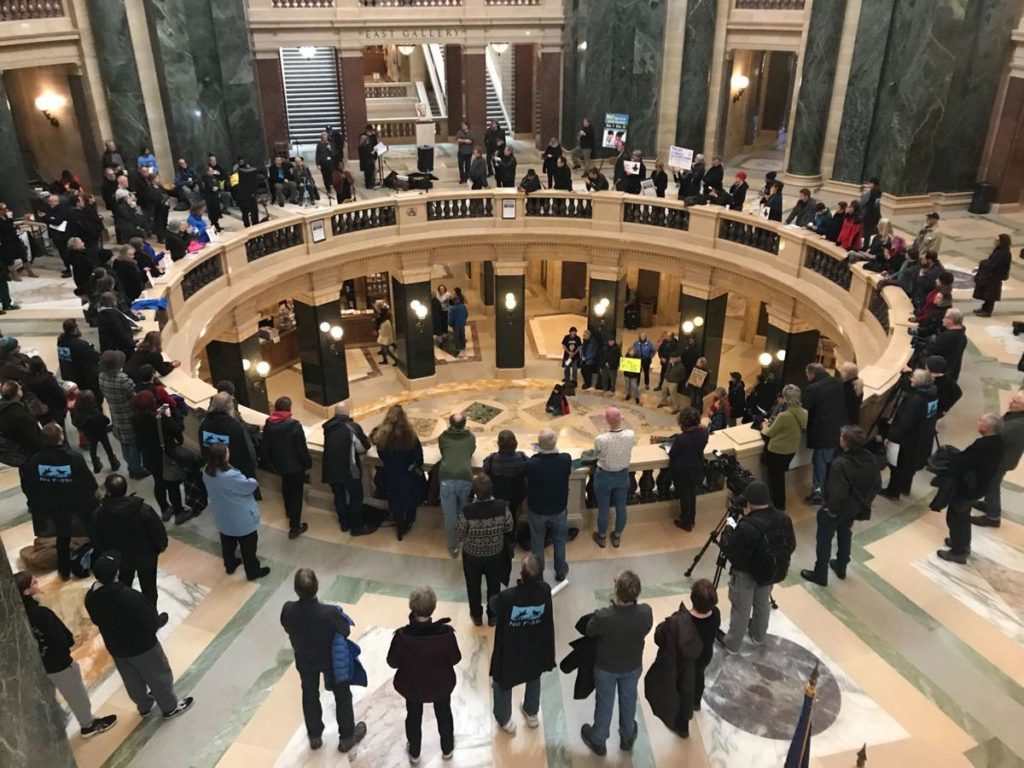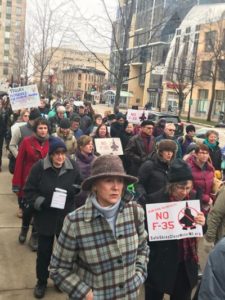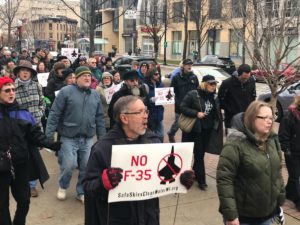‘No decision is final until we say so’: Madison F-35 protesters take to the Capitol
By Natalie Yahr Nov 29, 2019
Read original on The Cap Times site
Watch video of the rally here

While many headed to malls to begin their holiday shopping on Black Friday, about 150 people — many in black or donning capes emblazoned with the words “No F-35s” — gathered in the Wisconsin Capitol rotunda hoping to convince community members and politicians to oppose plans to bring a squadron of F-35 fighter jets to Madison’s Truax Field.
“It’s starting to look like something,” said organizer Bob Queen as he surveyed the crowd. “People are pissed.”
Queen, of the Safe Skies Clean Water Wisconsin Coalition, said the group, which has already distributed 1,200 yard signs, wanted to hold an event to rally support and build momentum before the weather turns colder.
“We gotta ask people if they’re gonna come march, if they’re gonna come out to the street, if they’re gonna stay active and hopeful,” Queen said.
The coalition has opposed the F-35s, citing among its concerns the effects of the jets’ noise on residents’ mental and physical health. A draft environmental report, published by the National Guard Bureau in August, indicated noise pollution from the jets would be significant and would disproportionately affect children, people of color and low-income households near the airport. A final environmental impact statement is expected in February 2020.
Speakers at the rally included Safe Skies Clean Water organizer Vicki Berenson, District 18 Ald. Rebecca Kemble, former District 12 Ald. Brian Benford, activist Brandi Grayson and realtor Jesse Pycha-Holst.
Addressing the crowd, Pycha-Holst of Solidarity Realty questioned the economic arguments for the F-35 plan.
 “These jets will render over $255 million of residential property incompatible for residential use. That’s the Air Force’s words, not mine,” he said, referencing projections that 1,000 homes would become unsuitable for living. “How much would you pay for home labeled ‘incompatible for residential use’?”
“These jets will render over $255 million of residential property incompatible for residential use. That’s the Air Force’s words, not mine,” he said, referencing projections that 1,000 homes would become unsuitable for living. “How much would you pay for home labeled ‘incompatible for residential use’?”
That number, said Pycha-Holst, is a conservative estimate, as it’s based on homes’ tax assessments. He asserted that the true value of the affected homes is likely ten times that. He said the effects will be felt not just by those who live near the airfield.
“The massive loss of equity will leave a sizeable dent in the city and county budgets,” he said, citing the loss in revenue due to lost tax base and loss in value of city property in the affected area. “The City of Madison — that means you, the taxpayer — owns considerable assets that fall under this scope, and if that housing needs to be relocated, who do you think is going to pay for that? Not the military. Madison taxpayers, even all you fellas on the west side.”
Queen said that loss in property values will also have personal consequences for residents.
“People who’ve worked all their lives, their health and well-being is in their homes,” said Queen, noting that residents depend on the value of their homes in order to retire, “and to take that out just makes them at risk for anything,” including foreclosure.
While the U.S. Air Force will make the final decision — likely in February — speakers and organizers argued that officials elected at the state and local level have the power to stop the F-35s.
“Just say ‘Go away,’ and they’ll go away,” said Queen, dismissing the idea that the decision is only “a federal thing.” Speakers cited Burlington, Vermont’s F-35s as evidence of Sen. Tammy Baldwin’s potential influence on the Madison decision. Vermont U.S. Sen. Patrick Leahy pushed for the F-35s despite local opposition, and Burlington became the first residential community in the U.S. to get the jets.
“If the mayor of the city comes up and says, ‘We’re not gonna stand for it.’ If the county executive says, ‘We’re not gonna stand for it’ … They have to be strong. That’s their job. They have to defend the health and well-being of their citizenry,” Queen said.
“This is not a done deal,” Vicki Berenson of Safe Skies Clean Water told the crowd. “We know from direct contact with some of the Air Force personnel that they’re still thinking about it. And we need to make sure they think real hard.”
But the message isn’t just for officials, said Jennie Capellaro, a member of Safe Skies Clean Water. Capellaro lives near Fair Oaks Avenue and Highway 30, which she refers to as “one of the last neighborhoods where there’s affordable housing.” According to official projections, Capellaro’s neighborhood would hear 65 decibels of noise from the jets. “It’s barely tolerable as it is,” she said of the sound of the F-16s currently in use at Truax Field.
Capellaro hopes that protests will raise awareness among community members.
“There are still many people, even in my own neighborhood, who don’t know that this is happening,” Capellaro said, adding that she hopes that those people will in turn contact elected officials “and especially Tammy Baldwin.”
“She’s supported this project for many years, which I do understand on a political level, up until we learned what we learned from the environmental impact statement,” Capellaro said. “Now it’s time for her to change her mind and do the right thing.”
Brandi Grayson, an activist and founder of Urban Triage, said she’s dedicated herself to the F-35 opposition because she’s seen firsthand who’s likely to be most affected, having lived in affordable housing less than a mile from the airport. Her building was made up of retired veterans, people with disabilities, working families and children.
“They’re often excluded from the conversation,” she said, referring to people of color and poor people. She glanced around the Capitol rotunda at the mostly white crowd. “As you look around, there’s not really too many of us.”
Those are, in part, the people she wants to reach.
“I hope the community hears us,” she said. “I hope that the community is able to build an analysis and understanding of how destructive this impact will be.
Asked how effective she thinks this sort of protest might be, she didn’t hesitate.
“I feel like it’s 100% effective. No decision is final until we say so. Even those in power will make a decision, but we get to decide by our actions and our inactions if we accept that decision.”
Meanwhile, Queen said he is already preparing the coalition’s “spring offensive.”
“We put this together in 10 days in cold weather and everybody’s away,” Queen said. “People said nobody would come. If we do this again in the spring, it will be 10,000 people wherever we do it. You have my promise.”

